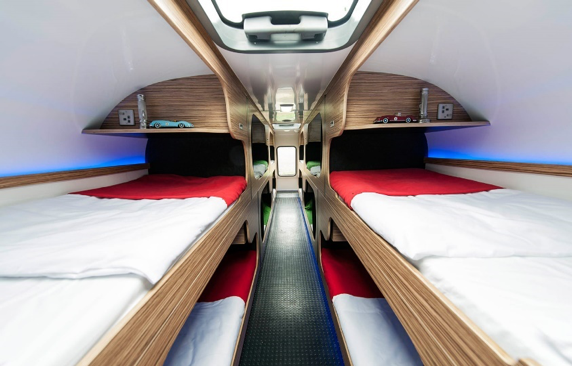Buses are known from helping us get from one location to the next, but there’s something else that they’re currently being used for. We’ve all heard of street food van vendors – but there are plenty of plucky entrepreneurs giving the humble bus a new identity and operating successful BUSinesses!
Want to venture into this new way of working yourself? All it takes is the right combination of knowledge, funding and daring. Here are some of the best examples from around the UK and the world. Together with Stagecoach, we show you how these entrepreneurs sold more than just bus fares on their buses!
Snooze on the move
It’s highly unlikely that you’ve slept the night on a bus. Some plucky entrepreneurs have transformed buses into hotels, such as East Yorkshire businessman, Oliver Kemp, who has created BEDROAM – a functional mobile hotel for use at events such as festivals. The bus features 18 luxury sleeping pods, two bathrooms and an outdoor space.
With around £60,000 being invested into the transformation of this bus, it has been featured on a few popular architectural television shows. Proof that with a bit of ingenuity, you can turn space-saving ideas into mobile business success!
An entrepreneur in Australia is doing something similar too, transforming his bus into a shelter for the homeless. These ‘sleepbuses’ are designed to shelter rough sleepers overnight.

Shop til’ you drop
High street shop space too expensive to run? Move where the people are by building your own shop on a bus. That’s what Lesley Tindle did, transforming an old Fiat Ducato community bus into a mini boutique.
However, what makes Tindle’s bus boutique so different is that the body of the bus can actually be expanded to create a larger shopping space for her customers. This idea shows the versatility of buses, allowing an owner to easily transport stock and sell it directly from their bus.
Office spaces on a bus
Buses in their regular form spark conversation between passengers, and this is no different when converting one into a communal office space. In some areas of the country, just having an area to focus on work can be costly as offices, hot desks and co-working spaces increase in price.
However, entrepreneur rishi Chowdhury changed this with his double decker — fancy getting yourself a weekly bus pass to work in there? The bus itself cost around £12,000 and the conversion cost up to £30,000 – but the vehicle acted as the IncuBus office space, hosting up to five startups at any one time. It’s proof that an innovative idea can work well, if you’ve got the business sense to try it.
Image source
The party bus
Buses are the new bars — or at least they’re going to be. One bus, christened Leyla, is the result of a 1966 Leyland Titan being renovated by owners David Humphreys and Alex Robinson. They spent around £60,000 converting it into a fully equipped bar, complete with a lounge area upstairs. Run as a private hire event attraction, this is just one example of a bar renovation.

Image source
Taking it up a notch is a Russian entrepreneur who has created a bus for A-Listers only — are you up for a spin around the city whilst drinking alcoholic beverages? Where some party busses in the UK are designed to get revellers from one location to another, Alexander Berest’s party bus is meant to be the destination.
However, you must consider a few things when venturing into a bus bar, especially the requirement of a licence to serve alcohol. You’ll also need to pay concession costs for events you attend, which can be pricey.
Eating on the go
With a growing interest in street food, buses are now taking into the form of restaurants! There have been a number of bus restaurant conversions in the UK – though one of the most popular is the Crust Conductor, which serves pizzas in its 34 seater restaurant. As a mobile business, it can visit festivals and food events but is primarily housed in London.
You probably haven’t thought about transforming a bus into your new office space, but it is a viable opportunity to take. Buses are traditionally used as transport vehicles – but as the future pushes innovation and conventions are challenged, it will come as no surprise to see more entrepreneurs stretching the limits of what can be achieved with a bus-borne business. However, with most people’s renovations costing upwards of £30,000, you’ll need plenty of investment behind you. Crowdfunding, anyone?




